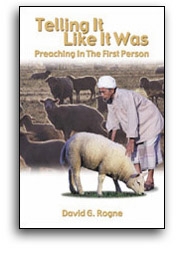SermonStudio
Chapter Five
Monologues
Telling It Like It Was
Preaching In The First Person
The world is often cruel to children and other innocents. It did not end with Herod. The newspapers are filled with the evidence that the slaughter of the innocents still takes place today. We live in a world where might seems to make right. We may wonder what kind of person could give the order to destroy children. A closer look at king Herod may help us to see the characteristics that are abundantly in evidence in despots today. The basic characteristic is a self-obsession that crowds out every other allegiance.


